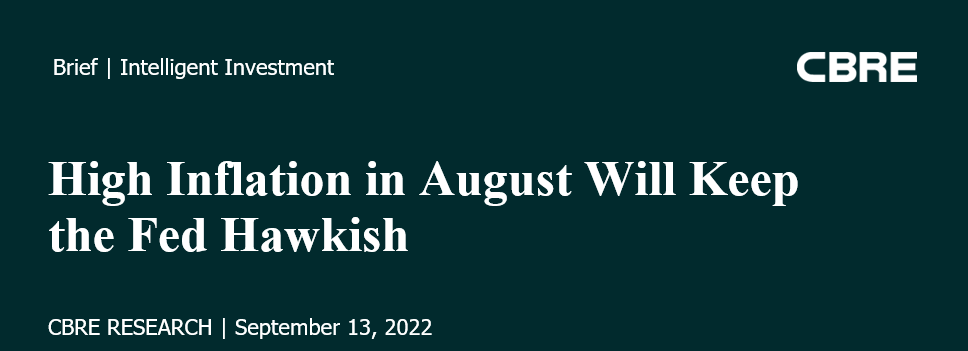
Executive Summary
• The Consumer Price Index (CPI) rose by 8.3% year-over-year in August, slightly above consensus estimates of 8.2%. Falling gas prices were offset by increases in housing, food and medical costs.
• Core inflation, which excludes food and energy prices, also increased more than expected, up by 6.3%. This likely will keep the Fed on track to raise the federal funds rate by 75 basis points (bps) later this month.
• The economy appears likely to maintain momentum in 2022, with a downturn ensuing next year. Slower economic growth amid tighter financial conditions will weigh on commercial real estate fundamentals and investment volumes, particularly in H1 2023.
August CPI
Prices rose by 8.3% annually in August, up 0.1% from July. An 11% drop in gas prices was offset by increases in housing, food and medical costs. Core inflation, which excludes volatile food and energy prices, increased 6.3% from a year ago and 0.6% from July. With core inflation continuing to rise, the Fed remains on course for a 75-bp increase in interest rates later this month. Financial markets sold off heavily in response to today’s CPI report, reflecting market concerns that the Fed will continue to aggressively tighten monetary policy.
Impacts on Commercial Real Estate
Multifamily
Any benefit to renters from a 10.6% month-over-month drop in gas prices in August was more than offset by annual increases of 11.4% for food, 6.2% for housing, 15.8% for electricity and 33.0% for natural gas. Multifamily fundamentals are affected by affordability of single-family housing and resiliency of the labor market. Nevertheless, as high prices continue to stress consumer budgets, multifamily rent growth likely will slow.
Industrial
The drop in gasoline prices last month provided some relief to the logistics sector, but fuel remains 26% more expensive than a year ago. While improving supply chain dynamics and a strong dollar that supports imports bode well for the industrial & logistics sector, a worsening economic outlook likely will weigh on demand for warehouse and distribution space.
Office
Prices for services, excluding energy, rose by 6.1% year-over-year in August. A more uncertain economic outlook will continue to weigh on the office market. However, leasing demand should pick up next year as uncertainty decreases and more workers return to the office.
Retail
Rising prices continue to erode consumer spending power. Prices for “food away from home” increased by 8.0% annually in August. Despite retailers providing discounts to offload large inventories, apparel prices rose by 0.2% month-over month. We expect a slowing economy will weigh on consumer spending later this year and into 2023, particularly for restaurants and travel-dependent sectors.
Hotels
Airfares fell by 4.6% month-over-month in August, while hotel average daily rates were flat. Lower airfares may lure back travelers but worsening economic conditions and less spending power will weigh on travel demand.
Looking Ahead
Persistent inflation will force the Fed to continue making aggressive interest rate hikes, with another 75-bp increase expected later this month. The possibility of the Fed achieving a “soft landing” for the economy is becoming more difficult.
Inflation should subside as higher interest rates weigh on demand and supply chain pressures continue to ease. CBRE forecasts that inflation will finish the year at more than 7% and fall to around 3% by year-end 2023. We expect the federal funds rate will peak around 3.75% to 4.00% next year. Tighter financial conditions and a weaker macroeconomic environment will weigh on real estate fundamentals. Investment volume will decline, particularly in H1 2023, but remain relatively strong on a historical basis.